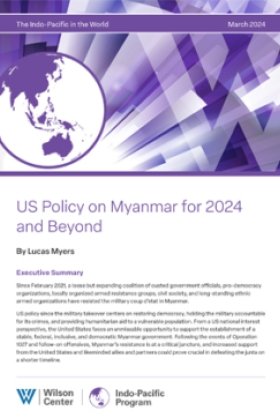The Mideast on Fire: What Happens Next?
Dalia Ziada, Blogger and Egypt Office Director, American Islamic Congress; Robin Wright, USIP-Wilson Center Distinguished Scholar
Overview
Dalia Ziada, Egypt Office Director for the American Islamic Congress and an award-winning blogger, provided a first hand report of the historic uprising in Egypt and offered insight into the challenges and opportunities now facing the Egyptian people.
On March 16, 2011 the American Islamic Congress (AIC) and the Middle East Program hosted a meeting on "The Mideast on Fire: What Happens Next?" with Ziada. Robin Wright, USIP-Wilson Center Distinguished Scholar, moderated the event.
Ziada, whose accomplishments include organizing Cairo's first human rights film festival and founding the Cairo office of AIC, indicated she did not know that when she joined a protest against police brutality on January 25 that she was participating in the first day of a revolution. She said she arrived expecting a demonstration like any other but quickly realized something monumental was brewing. Ziada described the ensuing 18 days of the Egyptian Revolution as the best of her life. She spoke of the people's unwavering commitment to nonviolence, even when former President Hosni Mubarak's government responded violently to their demonstrations. For Ziada, the arrival of the military in Tahrir Square marked a pivotal turning point in the uprising. Soldiers who had been sent to dispatch the protestors by any means necessary found themselves welcomed with flowers and chants of unity. Army officers expressed their sympathy with the protestors' cause by disobeying their orders and refusing to shoot a single person. Ziada described the atmosphere on February 11, the day Mubarak officially stepped down, as celebratory and remarkable, claiming the Egyptian people had realized the power of their voice and at last reclaimed their dignity.
When asked about the upcoming vote on the constitutional referendum in Egypt, Ziada expressed her disappointment with the proposed amendments. She had hoped for changes which would pave the way for constitutional liberalism, a liberal open market, political participation for Egypt's youth, and women's empowerment. Ziada noted that such empowerment will involve not only a change in legal practices that currently forbid women from occupying key political roles but also a shift in mentality. By way of example, she noted that the relative gender equality which prevailed in Tahrir Square, as men and women protested side by side, disappeared only a few weeks later when men harassed women's rights activists demonstrating on March 8, International Women's Day. Ziada described ways in which AIC in Cairo is working towards shifting attitudes and encouraging women's empowerment through grassroots educational and awareness-raising campaigns. Until women are empowered to participate in the political process, Ziada noted, Egypt will not enjoy a true democracy.
Ziada also emphasized the necessity of pushing back this year's Egyptian parliamentary and presidential elections, which are currently scheduled for June and September, respectively. She noted that this timetable does not provide enough time to educate citizens about their rights, nor does it allow for candidates to thoroughly prepare and explain their platforms so voters can make informed decisions. Currently, Ziada said, there is not a single potential presidential candidate who enjoys widespread support of the Egyptian people. She observed that her country is in a critical transformative period, and Egyptians must first establish a strong rule of law before electing a new leader loyal to the ideals and citizens of Egypt.
By Abby Arganese, Middle East Program
Haleh Esfandiari, Middle East Program
Speakers
Hosted By

Middle East Program
The Wilson Center’s Middle East Program serves as a crucial resource for the policymaking community and beyond, providing analyses and research that helps inform US foreign policymaking, stimulates public debate, and expands knowledge about issues in the wider Middle East and North Africa (MENA) region. Read more
Thank you for your interest in this event. Please send any feedback or questions to our Events staff.










